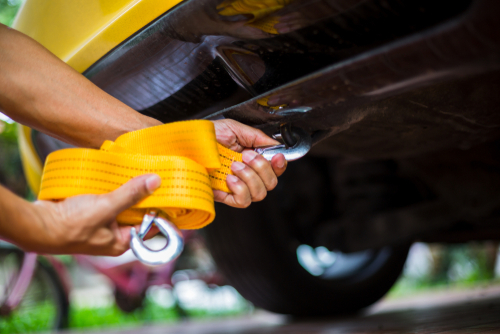It’s fair to say that we could all exercise a little more patience when we’re on the roads. Yes, it is frustrating being stuck behind an inexperienced caravan tower, particularly when they decide to speed up as the overtaking lane opens, making it unnecessarily difficult for the queue behind them to all pass safely. But towing heavy loads comes with a tricky set of challenges that can take a little while for some to get their heads around.
So, for those of you who may be new to it, here are 10 common misconceptions about towing that you should definitely be aware of.
1. Small trailers and caravans are easier to tow than big ones
It stands to reason, doesn’t it? Well, actually no. Small trailers and caravans weigh less, meaning they can move around a lot more, particularly in high winds. This makes them far more difficult to control around tighter corners and at high speed. A big heavy load is much less likely to get the wobbles. It pays to be extra vigilant when towing a smaller and lighter load.
2. A vehicle’s towing capacity is always reliable
Not to bring any manufacturer’s claims about towing capacity into disrepute, it’s just that there are factors that can affect your car’s ability to tow – weather conditions being one of the major ones. For example, the Skoda Kodiaq’s towing capacity is 2000kg in ideal conditions, but against a strong headwind, it’s going to be a little less than that. In other words, it’s always a good idea to give yourself a bit of wiggle room and avoid using up every single kilogram of towing capacity, otherwise a change in conditions could very easily get you into trouble.
3. Passengers and gear in the car do not count towards the total towing capacity
It’s easy to fall into the trap of considering towing capacity to just be whatever is attached to the towball. In actual fact, the towing capacity of a vehicle is determined by its Gross Combined Weight Rating—i.e. the trailer, the car and all their combined contents. The more you put inside the car, the less it can legally tow.
4. There’s no need to slow down when towing
Some vehicles specify a maximum speed when towing, and this can sometimes be slower than the road’s speed limit. It’s always advisable to check what speed your car suggests is the limit when towing. Yes, it can be frustrating, but it’s more important that you get to your destination safely. But again, just please don’t speed up when the overtaking lane opens!
5. You only need one safety chain
This may be the case for many vehicles on the roads that are towing, but any load above 2500kg is required by Australian law to be secured by two properly rated chain links.
6. Acceleration should bring trailer sway under control
This just simply isn’t true, and it’s a dangerous myth. Instead, you should gently ease speed until the sway stops. Or better yet, keep slowing and bring the car to a stop if you are able to. That way you can get out and inspect the vehicle to try to determine what caused the sway in the first place. Speeding up when your vehicle is experiencing a trailer sway could potentially lead to disastrous consequences.
7. Move heavy items to the back of your trailer to decrease towball weight
While this will indeed reduce towball weight, it will also dangerously increase the chances of experiencing trailer sway. If there is too much weight behind the back axle, a strong wind or sudden turn can cause a dangerous trailer sway that can be very difficult to recover from. Instead, you should be careful to distribute your load evenly throughout the trailer.
8. Just chuck it in the trailer, doesn’t matter how!
It actually makes a big difference how you load your trailer. As mentioned in the last point, too much weight behind the back axle can cause dangerous trailer sway. Meanwhile, uncarefully packed trailers with uneven weight distribution can be very unstable on the road so it is always best to pack the heavy items at the bottom of the trailer, and keep as much weight as possible on top of the axles.
9. A rear camera will do
Actually, towing mirrors are still quite necessary, even if your trailer or caravan does have a rear camera. Towing mirrors allow you to see along the length of the caravan rather than only behind it. Without these mirrors you are likely to have large blind spots that can lead to very dangerous situations on the road.
10. You should be able to guess your towball weight
The towball weight is the amount of weight exerted by the trailer or caravan on your vehicle’s towball. You should always check what the manufacturer recommends because excessive towball weights can lead to hitch failure. Always use a towball scale to make sure the weight is under the manufacturer’s set limit.
Of course, experience is the best way to learn what to do and what not to do when towing, but it is always handy to have a guide to get you started, and to debunk some common myths. Hopefully this handy list gives you a few pointers to get you started and steer you away from any dangerous practices. Now get out there and enjoy the trip!



